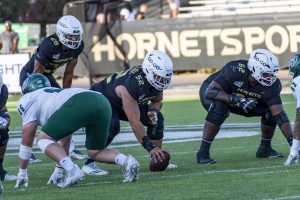Baseball team shares unwritten rules
April 18, 2012
Baseball has been America’s national pastime for more than 200 years. Originating in the 1800s by American Army officer Abner Doubleday, the sport gained popularity and grew to the multi-billion dollar organization it is today. Along the way, the sport has seen many great players, such as Babe Ruth, Lou Gehrig, Honus Wagner, and many more. The rules of the game, however simple they may seem, come with a 130-page guide full of hypotheticals and instructions explaining how the game is played. Even with a rulebook of that size, there is still room for a few more rules that do not make it in print – the unofficial, the unspoken, the unwritten rules of baseball.
These mysterious rules, though unspoken, but certainly understood by nearly every player in Major League Baseball are the instigation of many in-game brawls. It can start with a batter exaggerating a home run trot and subsequently being hit with a pitch in his next at-bat. Most of the unofficial rules explain the etiquette of baseball.
A few members of the Sacramento State baseball team give examples of the unwritten rules.
Head Coach Reggie Christiansen
Head coach Reggie Christiansen has a baseball-coaching career spanning three schools in addition to Sac State and said the Hornets do not practice some of the aggressive rules due to their consequences.
He said behavior by the team should be respectful and holds the team to a high standard of professionalism.
“If you go watch a junior high softball or baseball game you hear a lot of the cheerleading and you don’t hear much of that anymore in college baseball,” Christiansen said.
One unwritten rule is if a fight breaks out, the entire team is supposed to participate. He compared the problems a professional athlete and a college player would endure by following this rule.
“In the college level, for every guy who goes on the field there are suspensions and ejections. It’s been a long time since I’ve seen a fight at a college baseball game. It rarely happens,” he said.
Assistant Coach Tommy Nicholson
Assistant coach Tommy Nicholson has been involved in baseball for 25 years, and said players pick up the rules throughout their experiences in the game.
“You hear and learn about those things as you grow up,” Nicholson said. “You watch and see teams get in fights over things like that: It’s learn as you go.”
During his time in the minor leagues, some players have tried to learn the signals opposing teams would use to communicate and gain an advantage. This with other unprofessional actions can culminate into a fight with the team.
“It escalated over a number of games, eventually a guy got hit and that was enough and we ended up fighting,” Nicholson said. “(They were) picking signs at second base, hitters admiring home runs and pitchers celebrating after strikeouts, stuff that fires you up when you are on the other side.”
Nicholson said there has been a change in the attitude of these unwritten rules, where actions once considered rude are now part of the game.
“Forty years ago all those old-timers would say they wouldn’t let these guys get away with it, but now it happens all the time,” he said.
Infielder Clay Cederquist
Clay Cederquist, junior infielder, said the rules are mostly superstitious and personal rituals only some follow.
He said the rule about bunts should not be attempted during a no-hitter is not something he agrees with in order to advance the game.
“I am all for it. Bunts are part of the game, and if you can break it up, then break it up,” Cederquist said. “If I was that pitcher I would trust in my teammates they would make that play.”
He said being professional after hitting a home run and not over-celebrating is a general rule and hitters should make small celebrations.
“I think it’s universal.You hit a home run and get around the bases and don’t try to show up the other team,” he said.
The rule of not peeking at the catcher’s glove when batting is one he said is commonly broken and generally accepted.
“Batters shouldn’t, but you see that they do from time to time, along with base coaches relaying signs verbally,” Cederquist said. “It seems like it’s becoming more a part of the game.”
Joe Fleming and Joe de Ocampo can be reached at [email protected].























































































































